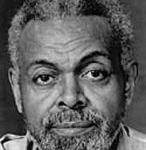Biography

Amiri Baraka was born on October 7, 1934, in Newark, New Jersey. Christened Everett LeRoi Jones, Baraka grew up in a middle class, family-oriented environment where he was encouraged to express himself through music, writing, and athletics. He attended Rutgers University from 1950 to 1952 before transferring to Howard University in Washington, DC, from which he received a bachelor’s degree in English in 1954. Baraka served in the Air Force after college and, when he returned from duty in 1957, he moved to Manhattan in the midst of the avant-garde Greenwich artist community. The next year he married Hettie Cohen, took a position editing the literary magazine Yugen with her, and opened a publishing company that printed volumes for poets such as Allen Ginsberg, a close friend and mentor of Baraka’s.
In 1961, Baraka published his own collection of poetry, titled Preface to a Twenty-Volume Suicide Note. Also in that year he and Diane Di Prima began to edit The Floating Bear, a literary magazine. He very powerfully revealed his strong racial perspectives at that time with the publication of two plays, The Slave and The Toilet. But it was Baraka’s next play, Dutchman, in 1964 that established him as an off-Broadway giant. He divorced Cohen in 1965 and embarked on several projects designed to increase a “cultural Blackness,” most of which were short-lived due to lack of support or awareness. He married poet Sylvia Robinson in 1967 and moved back to Newark.
The following year Baraka and his wife converted to Islam, changed their names, and formed Kawaida, a Black Muslim organization. … [published an autobiography in 1984 titled Autobiography of LeRoi Jones/Amiri Baraka] … He also took the chairman position in the Committee for Unified Newark, a Black United Front organization. He held this seat until 1975. His writings became more and more politically driven during that time. He took a strong interest in Marx’s and Lenin’s philosophies, simultaneously rejecting the Black nationalism he had previously advocated so fervently. While he founded these organizations and worked tirelessly to develop an ethnic identity of Black America, he continued to write highly influential and, in some cases, controversial poetry and dramas. He also edited several more literary magazines and anthologies. He published an autobiography in 1984 titled Autobiography of LeRoi Jones/Amiri Baraka.
Baraka taught at several colleges and universities throughout his career, including San Francisco State in California, Yale in Connecticut, and George Washington University in Washington, DC. Currently he teaches Africana Studies at the State University of New York in Stony Brook, where he has been employed for more than twenty years. His wife, now known as Amina Baraka, helps him run a community arts space in Newark, where they live.
Last updated June 29, 2011



